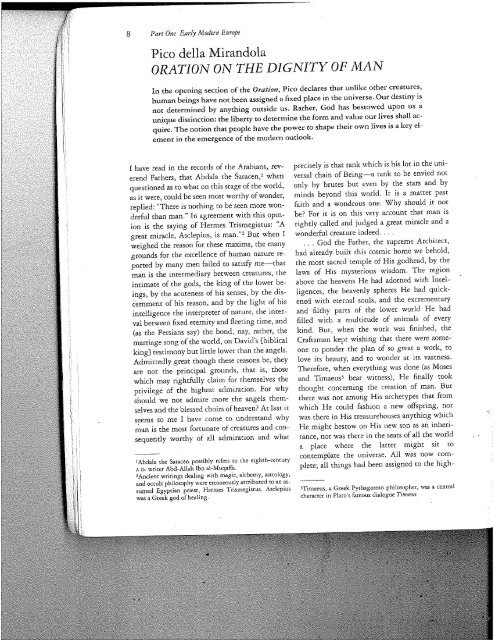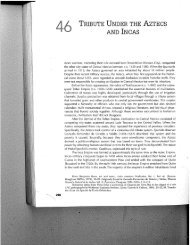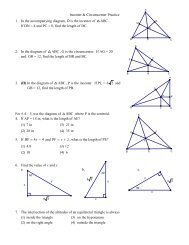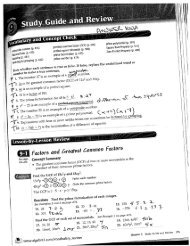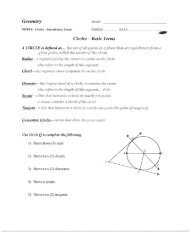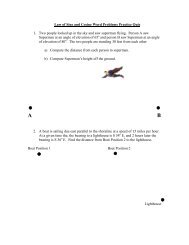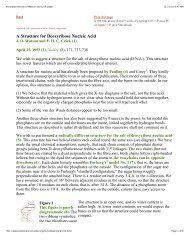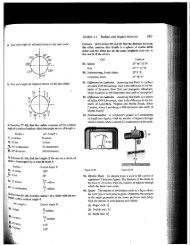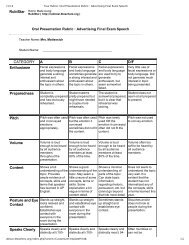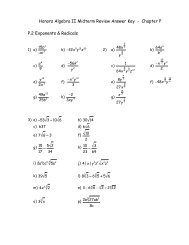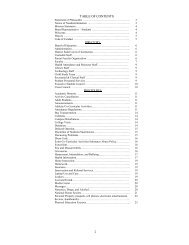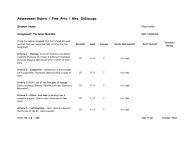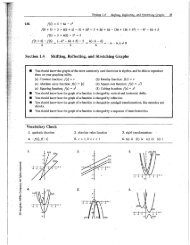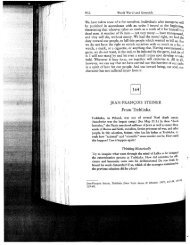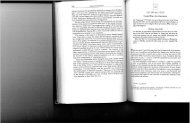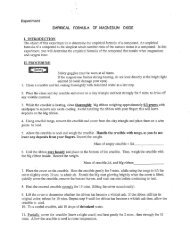Pico della Mirandola ORATION ON THE DIGNITY OF MAN
Pico della Mirandola ORATION ON THE DIGNITY OF MAN
Pico della Mirandola ORATION ON THE DIGNITY OF MAN
You also want an ePaper? Increase the reach of your titles
YUMPU automatically turns print PDFs into web optimized ePapers that Google loves.
<strong>Pico</strong> <strong>della</strong> <strong>Mirandola</strong><br />
<strong>ORATI<strong>ON</strong></strong> <strong>ON</strong> <strong>THE</strong> <strong>DIGNITY</strong> <strong>OF</strong> <strong>MAN</strong><br />
In the opening section of the Oration, <strong>Pico</strong> declares that unlike other creatures,<br />
human beings have not been assigned a fixed place in the universe. Our destiny is<br />
not determined by anything outside us. Rather, God has bestowed upon us a<br />
unique distinction: the liberty to determine the form and value our lives shall acquire.<br />
The notion that people have the power to shape their own lives is a key element<br />
:in the emergence of the modern outlook.<br />
I have read in the records of the Arabians, few<br />
erend Fathers, that Abdala the Saracen, 1 when<br />
questioned as to what on this stage of the world,<br />
as it were, could be seen most worthy of wonder,<br />
replied: "There is nothing to be seen more wonderful<br />
than man." In agreement with this opinion<br />
is the saying of Hermes Trismegistus: "A<br />
great miracle, Asclepius, is man. "2 But when I<br />
weighed the reason for these maxims, the many<br />
grounds for the excellence of human nature reported<br />
by many men failed to satisfy me--that<br />
man is the intermediary between creatures, the<br />
intimate of the gods, the king of the !ower beings,<br />
by the acuteness of his senses, by the dis-<br />
~ernment of his reason, and by the light of his<br />
intelligence the interpreter of nature, the interval<br />
between fixed eternity and fleeting time, and<br />
(as the Persians say) the bond, nay, rather, the<br />
marriage song of the world, on David’s [biblical<br />
king] testimony but little lower than the angels.<br />
Admittedly great though these reasons be, they<br />
are not the principal grounds, that is, those<br />
whic~ may rightfully claim for themselves the<br />
prjvileg4 of the highest admiration. For why<br />
should we not admire more the angels themsalves<br />
arid the blessed choirs of heaven? At last it<br />
seems to me I have come to understand why<br />
man is the most fortunate of creatures and consequently<br />
worthy of all admiration and what<br />
iAbdala ~he Saracen possibly refers to the eighth-century<br />
A.D. writer Abd-Aliah Ibn ai-Muqaffa.<br />
aAncient writings dealing with magic, aid~emy, astrology,<br />
and occult phi!osophy were erroneously attributed to an asstifled<br />
Egyptian priest, Hermes Trismegisrus. Asclepius<br />
was a Gr(ek god of healing.<br />
precisely is that rank which is his lot in the universal<br />
chain of Being--a rank to be envied not<br />
only by brutes but even by the stars and by<br />
minds beyond this world. It is a matter past<br />
faith and a wondrous one. Why should it not<br />
be? For it is on this very account that man is<br />
rightly called and judged a great miracle and a<br />
wonderful creature indeed ....<br />
... God the Father, the supreme Architect,<br />
had already built this cosmic home we behold,<br />
the most sacred temple of His godhead, by the<br />
laws of His mysterious wisdom. The region<br />
above the heavens He had adorned with Intelligences,<br />
the heavenly spheres He had quickened<br />
with eternal souls, and the excmmentary<br />
and filthy parts of the lower world He had<br />
filled with a multitude of animals of every<br />
kind. But, when the work was finished, the<br />
Craftsman kept wishing that there were someone<br />
to ponder the plan of so great a work, to<br />
love its beauty, and to wonder at its vastness.<br />
Therefore, when everything was done (as Moses<br />
and Timaeus3 bear witness), He finally took<br />
thought concerning the creation of man. But<br />
there was not among His archetypes that from<br />
which He could fashion a new offspring, nor<br />
was there in His treasurehouses anything which<br />
He might bestow on His new son as an inheritance,<br />
nor was there in the seats of a!l the world<br />
a place where the latter might sit to<br />
contemplate the universe. All was now complete;<br />
aI! things had been assigned to the high-<br />
3Timaeus, a Greek Pythagorean phiIosopher, was a central
and the lowest orders. But in its<br />
final creation it was not the part of the Father’s<br />
power to fail as though exhausted. It was not the<br />
part of His wisdom to waver in a needful matter<br />
through poverty of counsel. It was not the part<br />
of His kindly love that he who was to praise<br />
God’s divine generosity in regard to others<br />
should be compelled to condemn it in regard to<br />
himself.<br />
At last the best of artisans [God] ordained<br />
that that creature to whom He had been able to<br />
give nothing proper to himself should have joint<br />
possession of wharever had been peculiar to each<br />
of the different kinds of being. He therefore<br />
took man as a creature of indeterminate nature<br />
and, assigning him a place in the middle of the<br />
world, addressed him thus: "Neither a fixed<br />
abode nor a form that is thine alone nor any<br />
function peculiar to thyself have we given thee,<br />
Adam, to the end that according to thy longing<br />
and according to thy judgment thou mayest<br />
have and possess what abode, what form, and<br />
what functions thou thyselfshalt desire. The nature<br />
of all other beings is limited and constrained<br />
within the bounds of laws prescribed by<br />
Us. Thou, constrained by no limits, in acco><br />
dance with thine own free will, in whose hand<br />
We have placed thee, shall ordain for thyself the<br />
limits of thy nature. We have set thee at the<br />
world’s center that thou mayest from thence<br />
more easily observe whatever is in the world.<br />
We have made thee neither of heaven nor of<br />
earth, neither mortal nor immortal, so that with<br />
REVIEW QUESTI<strong>ON</strong>S<br />
Chapter 2 The Rise of Modernity 9<br />
freedom of choice and with honor, as though the<br />
maker and molder of thyself, thou mayest fashion<br />
thyself in whatever shape thou shalt prefer.<br />
Thou shall have the power to degenerate into<br />
the lower forms of life, which are brutish. Thou<br />
shall have the power, out ofthy sou!’s judgment,<br />
to be reborn into the higher forms, which are<br />
divine."<br />
O supreme generosity of God the Father, O<br />
highest and most marvelous felicity of man! To<br />
him it is granted to have whatever he chooses, to<br />
be whatever he wills. Beasts as soon as they are<br />
born (so says Lucilius) 4 bring with them from<br />
their mother’s womb all they will ever possess.<br />
Spiritual beings [angels], either from the beginning<br />
or soon thereafter, become what they are to<br />
be for ever and ever. On man when he came into<br />
life the Father conferred the seeds of all kinds<br />
and the germs of every way of life. Whatever<br />
seeds each man cultivates will grow to maturity<br />
and bear in him their own fruit. If they be vegetative,<br />
he will be like a plant. If sensitive, he<br />
will become brutish. If rational, he will grow<br />
into a heavenly being. If intellectual, he will be<br />
an angel and the son of God. And if, happy in<br />
the lot of no created thing, he withdraws into<br />
the center of his own unity, his spirit, made one<br />
with God, in the solitary darkness of God, who<br />
is set above ali things, shall surpass them all.<br />
aLucilius, a first-century a.D. Roman poet and Stoic philosopher,<br />
was a close friend of Seneca, the philosopherdramatist.<br />
1. According to <strong>Pico</strong> delia <strong>Mirandola</strong>, what quality did humans alone possess? What<br />
did its possession allow them ro do?<br />
2. How does <strong>Pico</strong>’s view poim to the emergence of the modern outlook?


